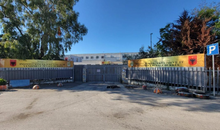
 Flash News
Flash News
Drenova prison police officer arrested for bringing drugs and illegal items into cell
Lavrov: NATO is risking self-destruction with new military budget
Kurti and Vučić "face off" tomorrow in Skopje
Construction worker dies after falling from scaffolding in Berat
The prosecution sends two Korça Municipality officials to trial

Naum Mara*
Photomontage/Exit.al
The future of the Greek capital does not seem very certain. Global warming and the heat of the city itself may render it uninhabitable in a few decades. As of now, many residents of Athens have thought of leaving the city for areas with more greenery and freshness. Maybe even in northern European countries.
What was immediately noticeable when visiting the Greek capital was the lack of large parks and the density of buildings. The Greek elite made a serious economic-social mistake in the 80s and 90s, concentrating the country's entire economy in the capital. The swelling of the state administration was another reason, that villages and small towns were abandoned and half of the population of Greece concentrated in Athens.
All this migration was accompanied by serious urban planning errors such as the development of new micro-regions without large green areas and without other public spaces, which would reduce the density of constructions in the city. This overcrowding of constructions was also influenced by the urban regulation, that constructions should not exceed the height of 12 floors. In almost all neighborhoods, not far from the center of Athens, plots that previously had only one house or a villa were replaced during the 80s and 90s with collective buildings from 6 to 12 floors.
Tirana risks the same thing as the Greek capital. Although its population is far from that of Athens, with the uncontrolled economic-urbanistic developments, it seems that after a few years it will have half the population of Albania. It is the same phenomena that repeat themselves. The concentration of all powers and institutions in the capital, the swelling of the state administration, public investments with a lot of difference from those made in other cities.
Since 1998, there has not been an urban planning orientation to create a 21st century city, but public areas and in recent years many areas of the Great Artificial Lake Park have continued to be given over to high-rise buildings. Overheating is visible in Tirana due to the reduction of green surfaces and the overload in the circulation of individual means of transport. Furthermore there are no plans to build a subway for this city which tends to go towards 1 million and more inhabitants.
But, even if the best urban planning criteria are decided for the capital, the main problem remains political and economic. It has to do primarily with the decentralization of power and the increase in the competences of local governments. But with the coming into power of the Socialist Party in 2013, the process of decentralization has not only stopped, but laws and decisions have been applied that have increased centralization. It seems impossible that Rama and Veliaj and company will let go in this direction. The ongoing constructions in Tirana are the main source of their personal income, as well as the purchase of elections. The megalomaniacal actions of organizing major artistic and sporting events are also likely to be repeated, as happened with the Greek adventure of the Olympic Games in 2004. It is the same scenario.
Let's do great things to "fix the millet", to advertise our genius and to personally benefit from public investments.
Tirana is among the cities with the most polluted air in Europe. It is difficult to find serious studies, based on accurate statistical data, on how the air quality and the increase in the temperature of the capital affect cardiovascular and lung diseases. But the fact is that during the three months of summer, life in Tirana becomes more and more difficult, especially for the elderly, who are also the poorest segment of the population and find it difficult to "summer" away from the capital.
We still have to hope in the "internationals" and in the tasks that Brussels will soon give us to accept us in the European family. Perhaps the mistakes made in Athens have opened the eyes of European bureaucrats to curb corruption and autocracy, which are the main reasons for the return of Mediterranean cities to settlements where the quality of life continues to decline.
*The author is an architect and lives in Canada
Latest news



Second hearing on the protected areas law, Zhupa: Unconstitutional and dangerous
2025-06-30 22:18:46



Israel-Iran conflict, Bushati: Albanians should be concerned
2025-06-30 21:32:42

Fuga: Journalism in Albania today in severe crisis
2025-06-30 21:07:11
"There is no room for panic"/ Moore: Serbia does not dare to attack Kosovo!
2025-06-30 20:49:53

Temperatures above 40 degrees, France closes nuclear plants and schools
2025-06-30 20:28:42
Lavrov: NATO is risking self-destruction with new military budget
2025-06-30 20:13:54
Turkey against the "Bektashi state" in Albania: Give up this idea!
2025-06-30 20:03:24

Accused of sexual abuse, producer Diddy awaits court decision
2025-06-30 19:40:44



Kurti and Vučić "face off" tomorrow in Skopje
2025-06-30 18:44:12
Tourism: new season, old problems
2025-06-30 18:27:23


Construction worker dies after falling from scaffolding in Berat
2025-06-30 17:51:44




Almost free housing: East Germany against depopulation
2025-06-30 16:43:06

Hamas says nearly 60 people killed in Gaza as Trump calls for ceasefire
2025-06-30 16:14:15
Drownings on beaches/ Expert Softa: Negligence and incompetence by institutions!
2025-06-30 16:00:03


European ports are overloaded due to Trump tariffs
2025-06-30 15:30:44
The prosecution sends two Korça Municipality officials to trial
2025-06-30 15:19:54

Lezha/ Police impose 3165 administrative measures, handcuff 19 drivers
2025-06-30 14:55:04
Young people leave Albania in search of a more sustainable future
2025-06-30 14:47:52
Record-breaking summer, health threats and preventive measures
2025-06-30 14:36:19


Constitution of the Parliament, Osmani invites political leaders to a meeting
2025-06-30 14:07:54

Heat wave 'invades' Europe, Spain records temperatures up to 46 degrees Celsius
2025-06-30 13:42:02
Accident in Vlora, car hits 2 tourists
2025-06-30 13:32:16

Kurti confirms participation in today's official dinner in Skopje
2025-06-30 13:03:27

Fight between 4 minors in Kosovo, one of them injured with a knife
2025-06-30 12:38:45

Report: Teenage girls the loneliest in the world
2025-06-30 12:20:40
Commissioner Kos and Balkan leaders meet in Skopje on Growth Plan
2025-06-30 12:07:59
Wanted by Italy, member of a criminal organization captured in Fier
2025-06-30 11:55:53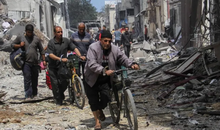
Hundreds of families displaced by wave of Israeli airstrikes in Gaza
2025-06-30 11:45:17

Zenel Beshi: The criminal who even 50 convictions won't move from Britain
2025-06-30 11:23:19
A new variant of Covid will circulate during the summer, here are the symptoms
2025-06-30 11:14:58


"Partizani" case, trial postponed to July 21 at the Special Court
2025-06-30 10:41:05
Uncontrolled desire to steal, what is kleptomania, why is it caused
2025-06-30 10:30:08
Requested change of security measure, hearing for Malltez postponed to July 7
2025-06-30 10:24:32


Output per working hour in Albania 35% lower than the regional average
2025-06-30 09:54:35

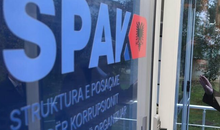
The trial for the "Partizani" file begins today
2025-06-30 09:27:57
22 fires in the last 24 hours in the country, 2 still active
2025-06-30 09:21:28
How is the media controlled? The 'Rama' case and government propaganda
2025-06-30 09:13:36
German top diplomat: Putin wants Ukraine to capitulate
2025-06-30 09:00:07
Foreign exchange, how much foreign currencies are sold and bought today
2025-06-30 08:44:38
Chart/ Sovereign risk for Albania from international markets drops significantly
2025-06-30 08:26:38
Horoscope, what do the stars have in store for you?
2025-06-30 08:11:44
Clear weather and passing clouds, here is the forecast for this Monday
2025-06-30 07:59:32
Morning Post/ In 2 lines: What mattered yesterday in Albania
2025-06-30 07:47:37
Milan make official two departures in attack
2025-06-29 21:57:23
6 record tone
2025-06-29 21:30:46
4-year-old girl falls from balcony in Lezha, urgently taken to Trauma
2025-06-29 21:09:58


Assets worth 12 million euros seized from cocaine trafficking organization
2025-06-29 19:39:43
Fire in Durrës, Blushi: The state exists only on paper
2025-06-29 19:17:48

Fire endangers homes in Vlora, helicopter intervention begins
2025-06-29 18:27:51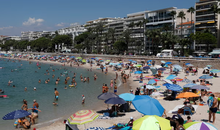
France implements smoking ban on beaches and parks
2025-06-29 18:02:08
England U-21 beat Germany to become European champions
2025-06-29 17:42:49
Trump criticizes Israeli prosecutors over Netanyahu's corruption trial
2025-06-29 17:08:10
Street market in Durrës engulfed in flames
2025-06-29 16:52:57

UN nuclear chief: Iran could resume uranium enrichment within months
2025-06-29 16:03:24
Albanian man dies after falling from cliff while climbing mountain in Italy
2025-06-29 15:52:01

Another accident with a single-track vehicle in Tirana, a car hits a 17-year-old
2025-06-29 15:07:15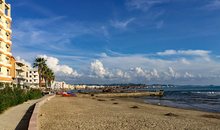
While bathing in the sea, a vacationer in Durrës dies
2025-06-29 14:54:01
Sentenced to life imprisonment, cell phone found in Laert Haxhiu's cell
2025-06-29 14:26:40
77 people detained in protest, Vučić warns of new arrests
2025-06-29 14:07:46
